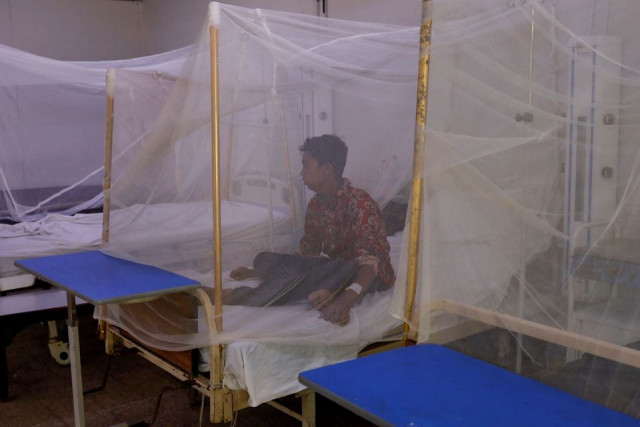Dengue outbreak worsens in Balakot
Locals demand health emergency amid allegations of negligence

Dengue fever is spreading rapidly in the Garhi Habibullah Union Council of Balakot and its surrounding areas, prompting calls from locals for urgent government intervention.
Over 100 patients have been admitted to the local government hospital, while private hospitals are also treating a growing number of people affected by the virus. Despite no reported fatalities at the government hospital, residents claim that four individuals in the area have already lost their lives due to the illness.
Garhi Habibullah Civil Hospital In-charge Dr Ehsan Shah confirmed that the Type D government hospital has received 100 dengue patients. He reassured the public that there is no need for panic, emphasising that dengue can be effectively prevented if precautionary measures are followed. According to Dr Shah, fumigation efforts are ongoing in the affected areas with assistance from the local administration to curb the spread of the mosquito-borne virus.
However, many locals feel that the government's response has been inadequate. Sardar Saeed, General Secretary of Anjuman Tajiran Garhi Habibullah, criticised the lack of proper facilities at government hospitals, stating that the available resources are insufficient for the prevention, diagnosis, and treatment of dengue.
He claimed that the number of dengue cases in Garhi Habibullah far exceeds the official reports, with many patients opting for private healthcare due to the inadequate services at public hospitals.
The situation in Garhi Habibullah has led to growing concerns among the local community, with many calling for the imposition of a health emergency to address the crisis more effectively. Community leaders argue that immediate government intervention is necessary to prevent further loss of life and to control the outbreak.
According to local sources, among the recent victims of the virus is a schoolteacher, Muhammad Arshad, from the village of Gul Dheri. His death, along with three others, is being attributed to a lack of timely treatment.
Local social worker Taufiq Ghani has urged the provincial government to take swift action, warning that the dengue virus is spreading rapidly in the area. He stressed that if proper steps are not taken soon, the situation could spiral out of control, with the virus spreading to neighboring regions. Ghani called for the deployment of more medical staff, equipment, and resources to handle the outbreak, as well as the expansion of fumigation efforts.
box
Pindi steps up dengue prevention
OUR CORRESPONDENT
RAWALPINDI. Rawalpindi Deputy Commissioner, Hasan Waqar Cheema, while acknowledging that the chances of dengue cases increased in the months of September and October, announced that important steps were being taken to prevent dengue in high-risk union councils.
Around 50 clinics that did not report dengue have been sealed, 300 beds – which can be increased to 1,000 if needed – have been reserved for dengue patients in various hospitals. The DC shared this information during a press conference, where CO Health, Dr Asif Arbab Niazi, and DHO, Dr Ehsan Ghani were also present.
They further said that there had been 850 reported cases of dengue last year, and that this year, dengue cases were relatively less. They added compared to previous years, the number of staff employed for the anti-dengue drive was less, but more larvae were recovered. According to their reported figures, dengue larvae were recovered from 43,000 houses and other 8,000 various places. Some 3,000 cases have been registered and 1,100 places have also been sealed.
The DC said that since this year, there had been three times more rain in August alone, it is crucial to spread awareness among the public. Citizens were urged not to let water collect anywhere, and to get blood CP test done immediately in case of fever. Moreover, he assured that the Parks and Horticulture Authority is doing a lot of work to find larvae in parks and green belts. Students in school are being educated about prevention measures, and citizens have been informed that they can file complaints about hospital staff through the dengue complaint box to aid operations against quack doctors.
He further said that dengue larvae mature every fortnight, which is why their work begins before the maturity season begins. "Awareness continues through our Dengue Seminars and Dengue Walk in Schools through Zero Period. Health teams check government buildings every three days, there is no shortage of dengue medicine in government hospitals, and we are working on proposals to conduct dengue tests at lower rates in government hospitals," he added.



















COMMENTS
Comments are moderated and generally will be posted if they are on-topic and not abusive.
For more information, please see our Comments FAQ